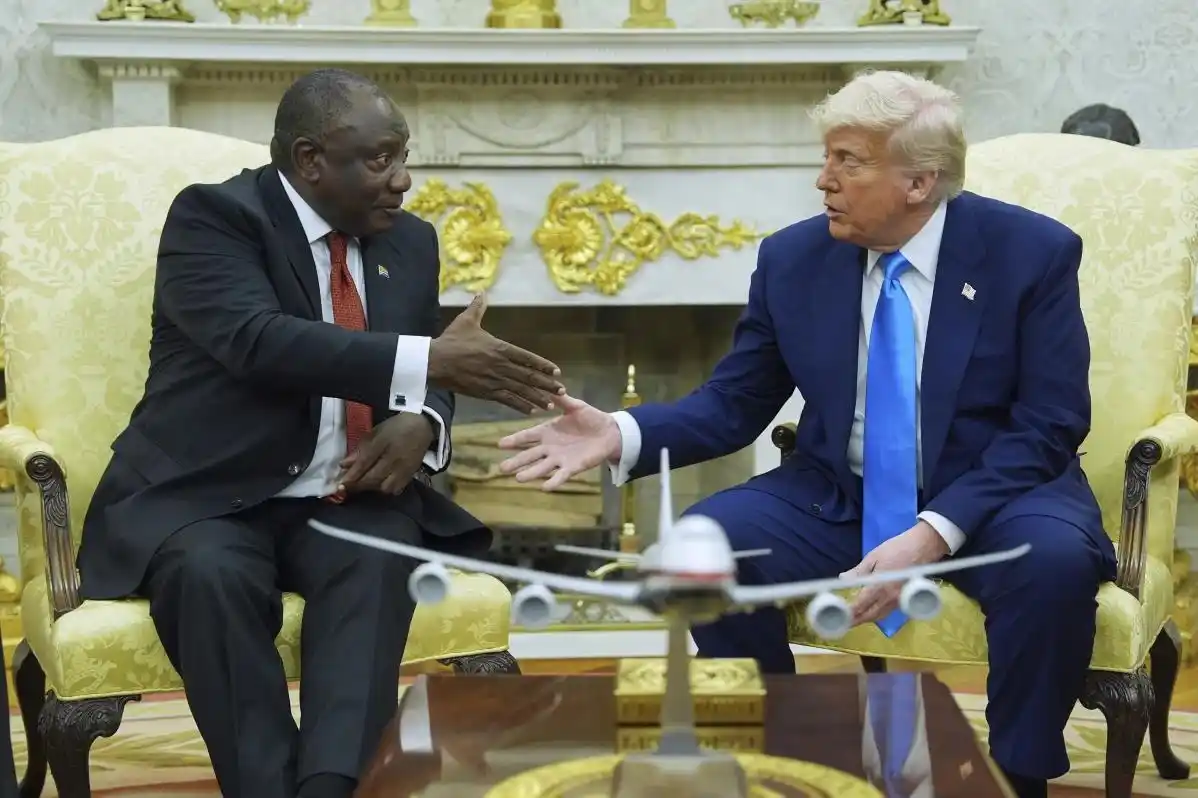
On May 21st local time, during a meeting at the White House with visiting South African President Ramaphosa, US President Trump had a heated debate over whether white genocide was happening in South Africa.
Ramaphosa said that Trump needs to listen to the opinions of South Africans. Trump responded by stating that there are “thousands of stories” and “documentaries” about the situation in South Africa, and then instructed staff to play a video allegedly about “white South Africans being subjected to violence”. Trump also browsed through so-called “news articles” emphasizing his views, stating that white farmers in South Africa are facing “death”. After the video ended, Trump and Ramaphosa had repeated discussions about the current situation.

Ramaphosa stated that these videos do not represent government policies, and he and his party “completely oppose” the language used in the videos. Ramaphosa also said that in South Africa, all races are affected by violent incidents, with black people being the most affected.
Since the beginning of this year, the relationship between South Africa and the United States has been tense
During his first presidential term in 2018, Trump advocated for the South African government to confiscate white land and carry out mass killings of white people, which was criticized by the South African government.
In February of this year, Trump criticized South Africa’s new version of the Expropriation Act, accusing the South African government of “confiscating land” as constituting “racial discrimination” against white South Africans, and issued an executive order announcing the cutting off of aid to South Africa. In March, South African Ambassador to the United States Rasul was expelled by the US for claiming at a seminar that Trump was leading the global white supremacist movement. On May 20th, US Secretary of State Rubio announced that the United States has chosen not to participate in this year’s G20 meeting hosted by South Africa.
In February of this year, the South African Department of International Relations and Cooperation issued a statement stating that the basic premise of the US administrative order involving South Africa was “materially incorrect” and ignored the painful history of colonialism and apartheid in South Africa. The statement expressed concern over the political propaganda campaign aimed at distorting South Africa and spreading false information. Disappointingly, this narrative style seems to have gained recognition from American decision-makers.
South Africa has repeatedly refuted the claim that ‘white South Africans are being persecuted’
The South African government has repeatedly emphasized that the claim of persecution against white South Africans is “completely false”.
The land issue in South Africa has a long history. The enactment and implementation of the Native American Land Act in 1913 resulted in a large number of black people being forcibly evicted from their land by the white government. After the end of apartheid in South Africa in 1994, most of the farmland still belonged to white people. The latest statistics show that white South Africans, who make up 8% of the country’s total population, own nearly three-quarters of South Africa’s farmland, while black people, who make up 80% of the country’s total population, only own about 4% of the land.
On January 23 this year, South African President Ramaphosa signed a new Expropriation Act, which clarifies that the government can expropriate land under conditions that are in the public interest, and establishes procedures for negotiation and compensation with landowners in accordance with the country’s constitution.
On February 2nd, Trump accused South Africa of “confiscating land” and treating certain classes of people “very badly” on social media. Ramaphosa responded on the 3rd that the South African government has not confiscated any land, and the recently passed “Expropriation Act” complies with the South African Constitution, aiming to ensure that South African citizens obtain land in a fair and just manner.
On February 8th, the South African Department of International Relations and Cooperation issued a statement stating that the basic premise of the US executive order regarding South Africa “contains factual errors” and ignores the painful history of colonialism and racial segregation in South Africa. We are concerned about this political propaganda campaign aimed at distorting our country and spreading false information
South African scholar: The United States has planned to smear South Africa’s image for political motives
In response to Trump’s accusations of “racial discrimination” against white South Africans since February, South African scholar Sizzo Nkala previously stated in an interview with CCTV reporters on May 12 that the US accusations against South Africa are “politically motivated” and violate international law and standards.
University of Johannesburg researcher Xizo Nkala: I believe this is a deliberate effort to tarnish the image of South Africa, with the aim of portraying it as a failed state by fabricating the claim that African citizens are persecuted in South Africa. I think this violates international law and norms. This behavior is very typical and is a common tactic used by the United States and Western countries when facing different positions from countries in the global South. South Africa is being punished for its foreign policy choices that are inconsistent with Western interests, which is a violation of South Africa’s autonomy and independence on the international stage.
(CCTV reporter Cao Jian)








